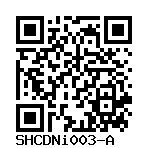The cell line is not validated yet.
SHCDNi003-A
General
Donor Information
General Donor Information |
|
| Sex | male |
| Age of donor (at collection) | 10-14 |
Phenotype and Disease related information (Donor) |
|
| Diseases | A disease was diagnosed.
|
| Family history | None |
| Is the medical history available upon request? | A one-year-old Chinese Han male infant with AHDS who presented with developmental delay, hypertonia, and often tilted his head back. Furthermore, he showed elevated serum FT3, decreased serum FT4 and T4. |
Karyotyping (Donor) |
|
| Has the donor karyotype been analysed? |
Yes
Karyotyping method:
G-Banding
|
Other Genotyping (Donor) |
|
| Is there genome-wide genotyping or functional data available? |
No
|
External Databases (Donor) |
|
| BioSamples | SAMEA7044789 |
Ethics
| Has informed consent been obtained from the donor of the embryo/tissue from which the pluripotent stem cells have been derived? | Yes |
| Was the consent voluntarily given? | Yes |
| Has the donor been informed that participation will not directly influence their personal treatment? | Yes |
| Can you provide us with a copy of the Donor Information Sheet provided to the donor? | Yes |
| Do you (Depositor/Provider) hold the original Donor Consent Form? | Yes |
| Please indicate whether the data associated with the donated material has been pseudonymised or anonymised. | anonymised |
| Does consent explicitly allow the derivation of pluripotent stem cells? | Yes |
| Does consent prevent CELLS DERIVED FROM THE DONATED BIOSAMPLE from being made available to researchers anywhere in the world? | Yes |
Does consent permit research by | |
| an academic institution? | Yes |
| a public organisation? | Yes |
| a non-profit company? | Yes |
| a for-profit corporation? | Yes |
| Does consent expressly permit collection of genetic information? | Yes |
| Does consent expressly permit storage of genetic information? | Yes |
| Does consent prevent dissemination of genetic information? | Yes |
| Has the donor been informed that their donated biosample or derived cells may be tested for the presence of microbiological agents / pathogens? | Yes |
| Has the donor consented to receive information discovered during use of donated embryo/tissue that has significant health implications for the donor? | Yes |
| How may genetic information associated with the cell line be accessed? | Open Access |
| Will the donor expect to receive financial benefit, beyond reasonable expenses, in return for donating the biosample? | No |
| Does the consent anticipate that the donor will be notified of results or outcomes of any research involving the donated samples or derived cells? | Yes |
| Has a favourable opinion been obtained from a research ethics committee, or other ethics review panel, in relation to the Research Protocol including the consent provisions? | Yes |
| Name of accrediting authority involved? | Ethics Committee of Shanghai Children’s Hospital |
| Approval number | REK 2017R021-F01 |
| Has a favourable opinion been obtained from a research ethics committee, or other ethics review panel, in relation to the PROPOSED PROJECT, involving use of donated embryo/tissue or derived cells? | Yes |
| Name of accrediting authority involved? | Ethics Committee of Shanghai Children’s Hospital |
| Approval number | REK 2017R021-F01 |
| For generation of the cell line, who was the supplier of any recombined DNA vectors or commercial kits used? | |
hIPSC Derivation
General |
|
| Source cell type |
A preparation of autologous peripheral blood mononuclear cells (PBMCs).
Synonyms
|
| Age of donor (at collection) | 10-14 |
| Collected in | 2019 |
| Source cell line vendor | Shanghai Children's Hospital |
| Passage number reprogrammed | 10 |
Reprogramming method |
|
| Vector type | Non-integrating |
| Vector | Sendai virus |
| Genes | |
| Is reprogramming vector detectable? |
Yes |
| Methods used |
PCR
|
Vector free reprogramming |
|
| Type of used vector free reprogramming factor(s) |
Protein
|
Other |
|
| Selection criteria for clones | cells are small and present a compact group |
| Derived under xeno-free conditions |
Yes |
| Derived under GMP? |
Yes |
| Available as clinical grade? |
Unknown |
Culture Conditions
| Surface coating | Matrigel/Geltrex |
| Feeder cells |
No |
| CO2 Concentration | 5 % |
| Medium |
Essential 8™
|
| Has Rock inhibitor (Y27632) been used at passage previously with this cell line? | Yes |
| Has Rock inhibitor (Y27632) been used at cryo previously with this cell line? | No |
| Has Rock inhibitor (Y27632) been used at thaw previously with this cell line? | Yes |
Characterisation
Analysis of Undifferentiated Cells
| Marker | Expressed | Immunostaining | RT-PCR | Flow Cytometry | Enzymatic Assay | Expression Profiles |
| SSEA-4 |
Yes |
|
||||
| TRA 1-60 |
Yes |
|
||||
| POU5F1 (OCT-4) |
Yes |
|
||||
| AFP |
Yes |
|
||||
| PAX6 |
Yes |
|
Score:
| Marker | Present | Absent |
| mCpG | ||
| OCT4 |
Morphology pictures
Microbiology / Virus Screening |
|
| Mycoplasma | Negative |
Certificate of Analysis |
|
| Is there a certificate of analysis available? |
Yes
Passage:
|
Genotyping
Karyotyping (Cell Line) |
|
| Has the cell line karyotype been analysed? |
Yes
The result displays a normal karyotype(46, XY),without detectable abnormalities.
Karyotyping method:
G-Banding
|
Other Genotyping (Cell Line) |
|


Login to share your feedback, experiences or results with the research community.